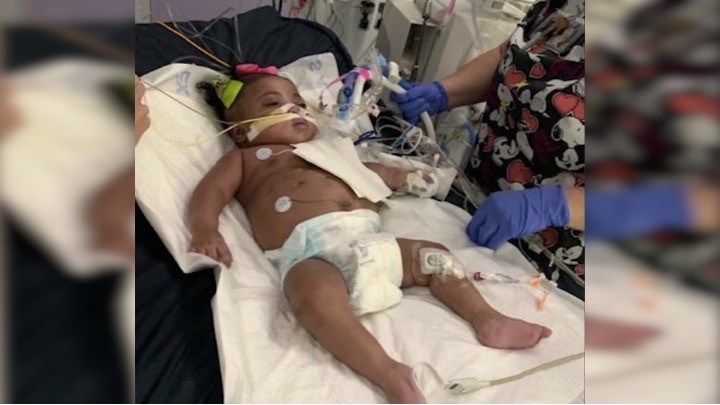
A new judge will decide if a Texas hospital can take 10-month-old Tinslee Lewis off life support. A hearing for Lewis’ case has been scheduled at 9 a.m. Thursday in the 48th District Court in Fort Worth, Tinslee’s family’s attorney Joe Nixon confirmed Tuesday.
A temporary restraining order stopping Cook Children’s Medical Center in Fort Worth from removing life-sustaining treatment for Lewis was set to expire Tuesday. But after the removal last week of Tarrant County Juvenile Court Judge Alex Kim, a new hearing on the family’s request for a temporary injunction will now be held Thursday in Fort Worth.
Cook Children’s spokeswoman Wini King said the situation is “hard all the way around.”
“We would love nothing more than to be able to make her better and walk her out of here. … But there comes a point, there comes a time when we have to say: we can’t do any more, it’s not making it any better.”
Doctors say further care is futile and they believe she’s suffering. Her family is seeking another facility to treat the girl.
Doctors had planned to remove Tinslee from life support Nov. 10 after invoking Texas’ “10-day rule,” which can be employed when a family disagrees with doctors who say life-sustaining treatment should be stopped. The law stipulates if the hospital’s ethics committee agrees with doctors, treatment can be withdrawn after 10 days if a new provider can’t be found to take the patient.
“I believe the statute is facially unconstitutional — we will be making that argument in court,” Nixon said.
Under the current 10-Day-Law, enacted in 1999, a partial hospital committee has the power to decide to withdraw treatment for any reason, including the subjective assessment of “quality of life.” The hospital can then remove treatment, even life-sustaining treatment (ventilator, dialysis, etc.), and the patient cannot appeal the decision. Even if the patient is conscious, coherent, and actively requesting the continuation of life-sustaining treatment, the 10-Day-Law gives the hospital the power to overrule the patient’s wishes.
Judge Kim, who issued the temporary restraining order on Nov. 10, was removed from the case Dec. 4 after the hospital filed a motion questioning his…








